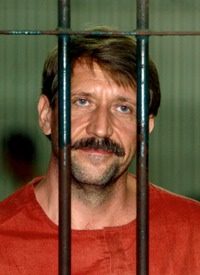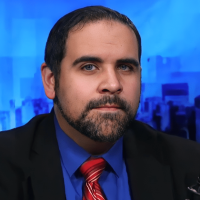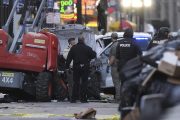
“One hundred surface to air missiles, 20,000 machine guns, 20,000 grenades, 740 mortars, 350 sniper rifles, 10 million rounds of ammunition and five tons of C-4 explosives,” McGuire told the jury in his opening statement. “Viktor Bout wanted to provide all of it to a foreign terrorist organization he believed wanted to kill Americans. He had the experience to do it, he had the expertise to do it, he had the will do it. He wanted to do it.” McGuire asked the court, “Why — for the money?”
According to Viktor Bout’s own words, as recounted by the undercover DEA agent responsible for Bout’s capture, Louis Milione, in a television interview on the CBS show 60 Minutes, prior to his arrest Bout told Milione that he would be able to supply "anti-personnel mines. Fragmentation grenades. Armor-piercing rockets. Money laundering services. And all within the context of speaking about a shared ideology of communism and fighting against the Americans.” (Emphasis added.)
Bout made these remarks to Milione and another undercover DEA agent, believing them to be “Ricardo and Carlos” — members of the Colombian Marxist narco-terrorist group FARC. This and other statements made by Bout during his conversation with the undercover agents were recorded on audio by the Drug Enforcement Agency.
Following this exchange between Bout and the agents, DEA and Thai law enforcement burst into the hotel room where the men conversed and took Bout into custody. He was then extradited to the United States in November of last year to face trial.
“You will hear those recordings in this trial and you will hear Bout,” McGuire told the jury Wednesday.
In 2008, the Justice Department indicted Bout on four separate terrorist offenses:
- Count one: conspiracy to kill U.S. nationals;
- Count two: conspiracy to kill U.S. officers or employees;
- Count three: conspiracy to acquire and use an anti-aircraft missile; and
- Count four: conspiracy to provide material support or resources to a designated foreign terrorist organization.
With regard to count four, Bout is wanted for inciting civil wars and trafficking arms to Afghanistan, Angola, the Democratic Republic of Congo (formerly Zaire), Liberia, Libya, Rwanda, Sierra Leone, and Sudan. The United Nations passed a resolution restricting Bout’s movements after he sold arms to Liberian dictator Charles Taylor and other African rulers in the 1990s.
In 2008, when Bout was arrested in Thailand, he had left his home in Moscow, violating the UN resolution.
Prior to the 1991 collapse of the Soviet Union, Bout served as an officer in the Soviet military intelligence, known as the GRU. But with the USSR no longer overtly promoting communism and outright military conquest, Bout supposedly left the GRU.
In 1991, at the age of 24, Bout founded his own air shipping company using Ilyushin Il-76 cargo planes left behind as a result of the collapse. The vast overstock of Soviet weapons were allegedly transported to countries around the world via Bout’s fleet of Ilyushin cargo planes.
The prosecutor made the case that Bout intended to use his planes to deliver the arms to the agents he believed to have been FARC operatives.
Bout’s defense attorney, Albert Dayan, countered the prosecutor, denying that his client agreed to sell any weapons to the undercover DEA agents. He claimed rather that Bout agreed to sell the agents only two transport jets, for a total cost of $5 million.
“Viktor was baiting them along with the promise of arms, hoping just to sell his planes,” Dayan argued.
Although the evidence presented against Bout thus far relates only to the alleged purchase of arms to FARC rebels, he remains wanted for his sale of arms to Third World dictators and terrorist groups throughout the 1990s.
Russia states that such international charges are outside of the jurisdiction of the United States. Even the alleged crime and sting operation that led to the capture and extradition of Bout occurred on Thai soil, which Russia argues is where Bout should be tried instead of in a U.S. court.
If convicted, Bout faces anywhere between 25 years to life in prison.
Photo of Viktor Bout: AP Images




